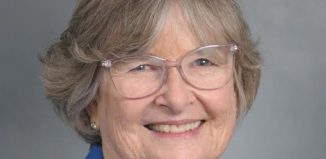(Un)Civil Discourse: How Admins on Local Social Media Groups Try to Keep Communities Together

While there were times when people would meet at the post office or corner store to discuss local happenings or gossip, much of that has been transferred online, specifically, for many communities, onto Facebook.
Facebook, which was originally designed for college students to judge the attractiveness of coeds, has since morphed into a social media giant. Mark Zuckerberg, the creator of Facebook, is worth over $54 billion. In that time the site has gained that popularity; the population of the over 2.3 million Facebook users has also skewed older as now the average user is between the age of 25 and 34.
In a 2017 report by Pew Research Center and Elon University, experts in the technology world generally said they believe online discourse will be shaped even more by trolls and other bad actors. Anonymity, experts said, is a leading cause of the general negativity seen with online communication.
“The most you can do with a forum is provide guidelines of what’s appropriate and what’s not and try and induce some level of civility.”
— Rob DeStefano
But what should happen if that negative communication is with the person living down the street, or with a mother or father in the same grade as your own child?
It’s hard to estimate just how much work goes into maintaining these community pages, and even more so, keeping individuals’ posts from spilling over into name calling, anger or worse. Community group admins, some of whom asked not to be named in this article due to the sensitivity of their jobs or their work with the community, spoke with TBR News Media about the difficulty of keeping topics online from spiraling out of control, especially those that deal with politics. It is something many admins of pages who wish to keep talk civil deal with on a daily basis.
Karen Sobel Lojeski, a professor in the College of Engineering at Stony Brook University, has talked about the impact social media has made on the professional world, but she also coined the name, The Threshold Generation, or effectively the last generation of people, aged in their 20s and upward, who knew what it was like to live both with and without these connective technologies.
Many of those who run these community groups are a part of that so-called threshold generation, and have noticed what has happened to the general discourse over time. Rob DeStefano, a member of the Comsewogue school board and lifetime member of the Port Jefferson Station/Terryville community, created and has run the Comsewogue Community Facebook page since 2010. What started as a group of just a few hundred members looking to talk about what was working or not working in the school district and local community has become 5,400 members posting about everything from local happenings to medical advice to politics, though one’s mileage may vary on the last one.
“It’s certainly gotten harder because of the different ways social media is used compared to how it was then, but you just try and hold true to what the intent of the page is,” DeStefano said. “The goal is to make sure everyone in the community knows of things that are happening locally or beyond.”
The “beyond” is where things get complicated. Every year the community is notified of the Terryville Fire Department’s carnival or route for Santa during Christmastime, but when neighbors start discussions on topics, for example, about recent police protests and rallies, the dialogue becomes rough, to say the least.
“Your heart hurts hearing the way some people talk to each other on social media because you know it’s very different than how they behave in person,” he said. “The most you can do with a forum is provide guidelines of what’s appropriate and what’s not and try and induce some level of civility.”
Worse, is when these groups where admins try to stay nonpartisan deal with rumors, or worse, conspiracy theories. In early May, a video called “Plandemic” made its rounds on social media. In a video that called itself a trailer for a larger documentary, former chronic disease syndrome researcher Judy Mikovits talked about a large organized effort of global elites to profit off infectious diseases, despite there being no tangible evidence of this widespread conspiracy.
“Then, even walking down the street or watching my kids games with other parents you could feel the hatred and tension.”
— Brenda Eimers Batter
The Pew Research Center released a report June 29 with a survey of 9,654 U.S. adults about how many people see conspiracy theories in COVID-19 news. The report said one in five of those who often rely on social media for coronavirus news say they watched at least part of the “Plandemic” video, while a comparative 10 percent of respondents who said they don’t get COVID news through social media saw it. Among those who have heard of this conspiracy, a reported 36 percent said they think it is either definitely or probably true.
“Plandemic” spread to multiple Facebook groups in the local area, and though many admins delete posts sharing the video, it wasn’t before likely hundreds of members saw it.
Usually, the most volatile discussions revolve around politics, but sometimes, even cases of a local school district issue can devolve into vitriol. What’s worse is when that animosity leaps the screen and starts impacting normal life. Brenda Eimers Batter, who admins the nearly 2,500-member Facebook group UNOFFICIAL INFORMATIONAL Port Jeff Villagers, said she has seen how online dialogue can have a real impact on normal life. In 2017, with the Port Jefferson School District asking residents to vote on a $30 million bond, Eimers Batter said things got “really ugly.”
“Then, even walking down the street or watching my kids games with other parents you could feel the hatred and tension,” she said. “That’s when I stepped in and tried to clean it up.”
That specific Facebook group, the most popular of a village with a real-world population of just over 8,100 residents, has seen changes over time, including a recent name change to add the word “Informational.” Smaller splinter groups in the village have broken off from the most popular page specifically for politics or for more hot button issues. It still does not stop some from regularly posting about such issues anyway.
For DeStefano, the objective is never to silence community residents, though he has felt he has had to delete posts when they seem incendiary. He says he tries to remind people that despite the digital divide, they remain neighbors.
“You wouldn’t talk to each other like this if you were standing on line next to a person in your local supermarket — so why do it here?” the Comsewogue school board trustee said. “People tend to isolate their behavior on social media as being separate from their identity, but it’s not.”






